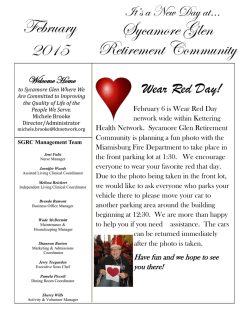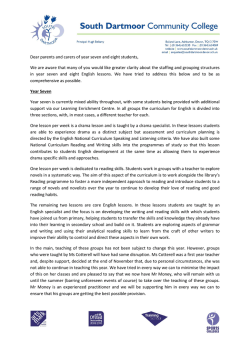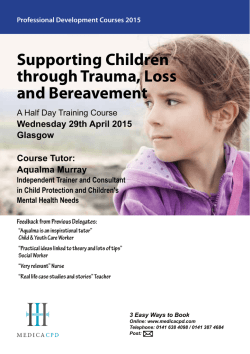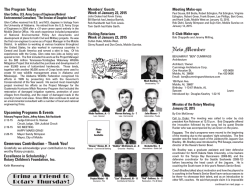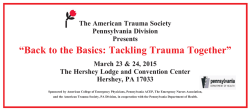
click here
1 CONTENTS 5Introduction 7Overview 8 Character guide 12 Episode synopses Interviews: 15Jed Mercurio, Creator and Executive Producer 17 Lennie James 19 Claire Skinner 20 Catherine Walker 22 Kimberley Nixon 23 Prasanna Puwanarajah 24 Neve Mcintosh 25 Ellen Thomas 26 Danny Kirrane 27 Mark Redhead, Executive Producer 28 Christopher Hall, Producer 29Contacts 2 3 INTRODUCTION ADAM MACDONALD, DIRECTOR OF SKY 1 CAMERON ROACH COMMISSIONING EDITOR, DRAMA One patient, one hour, one life. That’s the deceptively simple premise of Critical, our full-throttle, real-time medical drama from Jed Mercurio, the man behind Cardiac Arrest - I am a huge fan - Bodies and, most recently, Line of Duty. Jed is slicing back into the genre in which he made his name and the result is a pulse-racing piece of television that should have customers on the edge of their seats. Critical is as real as medical dramas come. Offering an authentic view of emergency medicine, it’s all about the incredibly pressurised hour in which a team of doctors and nurses battle to save a life. Jed Mercurio is one of the most sought-after writers in the UK and to have our first medical drama come from the master of the genre is such a coup. The series delivers an unflinching mix of blood, sweat and tears, following a team of medics as they fight against a ticking clock to pull patients from the brink of death. There is a rollercoaster-ride quality to the show and, instead of spoonfeeding the story, it throws audiences into the thick of the action. By the end, you’ll know the difference between polytrauma and an intrathoracic haemorrhage. We’ve assembled a knockout cast around the operating table, too, from familiar faces Lennie James and Claire Skinner to up-and-coming talents like Kimberley Nixon. Creating full-bodied characters you really root for, they’ve brought out the richness of the scripts, managing to say so much with a single glance or inflection, while also convincingly nailing the medical jargon, which is no mean feat. 2015 is going to be a big year for Sky 1, especially in terms of drama. All the ingredients we look for in our commissions, authenticity, exuberance, heart and heroism, are embedded in the DNA of Critical, which is just the start of a new wave of ambitious homegrown programmes, namely the final chapter of Strike Back, comedy drama Apocalypse Slough, starring Rob Lowe (The West Wing) and Yonderland’s Mathew Baynton and, by the year’s end, animated treat Fungus the Bogeyman. 4 Jed has created a series in which authenticity comes before anything else and Critical is going to give customers the experience of working on the front line of critical care. If you go into any A&E department up and down the country, you’ll see that it’s a very diverse environment and, as such, we have a wide ranging and varied group of characters. We’ll see how amazing and dedicated they are as a medical team, as well as seeing the challenging pressures, personal and professional that they face. Within this environment we go on a journey with our characters that is utterly gripping: they each have personal challenges to overcome while trying to stay at the top of their game. As we experience what the team goes through, we’re given a view of the medical procedures that is very real - a lot of time has gone into ensuring the detail is as accurate as possible. And this authentic feel goes right across the board, from set design to prosthetics. Critical is a unique and compelling series that throws you into the thick of life-saving medicine. It’s unlike anything we’ve seen before. 5 OVERVIEW 60 MINUTES TO SAVE A LIFE Sky 1 enters into the medical genre with a raw, real-time drama created by Jed Mercurio (Line of Duty). Boasting a top-drawer cast that includes Lennie James (The Walking Dead), Claire Skinner (Outnumbered), Catherine Walker (Strike Back) and Kimberley Nixon (Fresh Meat), this gripping 13-parter follows a team of highly-skilled doctors and nurses as they fight to save patients during the most lifethreatening hour of their treatment. Set in a state-of-the-art Major Trauma Centre, a unit which treats only the most gravely ill or seriously injured, each episode features a new and distinctive case told with thrilling intensity. Whether that patient lives or dies is determined by knife-edge decisions and procedures, but can the diverse team of medical professionals knit together and rise to the challenge? Critical is a series about medicine where our team hold a life in their hands but in every case they face the agonisingly real fear that it could slip through their fingers. The series is produced for Sky by Hat Trick Productions. The Executive Producers are Jed Mercurio, Mark Redhead for Hat Trick Productions and Cameron Roach for Sky. The lead director for the series is BAFTA® award winning Jon East and the producer is Christopher Hall. 6 7 CHARACTER GUIDE MRS LORRAINE RAPPAPORT (Claire Skinner) Job Title: Consultant / Trauma Team Leader Department: Vascular Surgery As a trauma team leader, Lorraine is liked and respected by all her colleagues, but clashes with seniors who don’t feel as strongly as she does about patient welfare. DR CLIVE ARCHERFIELD (Peter Sullivan) Job Title: Consultant / Clinical Lead Department: Emergency Medicine Dr Archerfield is the senior doctor in the Emergency Department. He’s driven solely by a desire to meet and exceed hospital targets, even if that means jeopardising the welfare of its patients and staff. MR GLEN BOYLE (Lennie James) Job Title: Locum Consultant / Trauma Team Leader Department: Acute Care Surgery Glen is a specialist in critical injuries, having spent a large portion of his career as a soldier, working as a trauma surgeon in conflict zones. MISS FIONA LOMAS (Catherine Walker) Job Title: Trauma Fellow (ST4) Department: Vascular Surgery Fiona is a highly competent surgeon courageous enough to take on cases beyond her experience level. DR RAMAKRISHNA CHANDRAMOHAN (Prasanna Puwanarajah) Job Title: Anaesthetic Registrar (ST5) Department: Anaesthesia Ramakrishna takes his work very seriously, but has a bit of an eye for the ladies and enjoys laddish banter. He’s the epitome of “work hard, play hard”. 8 MRS NICOLA HICKLIN (Neve McIntosh) Job Title: Nurse Consultant / Deputy Clinical Lead (Band 8) Department: Emergency Medicine Nicola is the head nurse, equivalent to matron of the department. Despite a frosty exterior, she endeavours to be fair and ethical. 9 CHARACTER GUIDE BILLY FINLAY (Danny Kirrane) Job Title: ODP (Operating Department Practitioner) (Band 5) Department: Anaesthesia Billy is Ramakrishna’s righthand man. He’s larky and funny, and has a loveable brashness about him. SISTER CONSTANCE CAMPBELL (Ellen Thomas) Job Title: Sister (Band 7) Department: Emergency Medicine Constance is very much an old school nurse and prefers to address her seniors formally. She’s a valued and loyal member of the team. 10 10 DR ANGHARAD ‘HARRY’ BENNETT-EDWARDES (Kimberley Nixon) Job Title: ST2 Department: Emergency Medicine Harry is the newest recruit to the team as a junior doctor, or “SHO”. She’s exceptionally clever and has a great head for numbers. JUSTIN COSTELLO (John MacMillan) Job Title: Staff Nurse (Band 5) Department: Emergency Medicine Justin is young and keen, a “trauma bunny” who gets excited by the goriest injuries and procedures. SISTER NERYS MERRICK (Mali Harries) Job Title: Trauma Nurse Practitioner (Band 7) Department: Orthopaedics GILES DHILLON (Paul Bazely) Job Title: Trauma Manager Department: Emergency Medicine Giles has a wry sense of humour and is sometimes an annoyance to the trauma team with his endless questionnaires and paperwork. Nerys is warm and compassionate, with a soft spot for Justin. She isn’t afraid to take a stand against management when necessary. MRS REBECCA OSGOOD (Emma Fryer) Job Title: Registrar (ST4) Department: Orthopaedics A hard-working mother, Rebecca is the antithesis of a clichéd rugby-playing male orthopod. BRIAN ZHAO (Orion Lee) Job Title: CT Radiographer (Band 6) Department: Radiology Brian is the obsessive compulsive CT Radiographer. He likes order and routine, and doesn’t improvise well. SHELLEY IMMS (Juliet Oldfield) Job Title: Radiographer (Band 6) Department: Radiology Shelley is willing and efficient, but perhaps a tad deluded when it comes to matters of the heart. 11 11 EPISODE SYNOPSES Episode 2 Episode 3 Logline Logline Synopsis Synopsis Episode 4 Episode 5 Logline Logline Synopsis Synopsis A fall from height leaves a woman horrifically impaled, and a new consultant takes charge of a daring life-saving operation. It’s a horrific sight when a patient with a fence post impaled through her face is brought in. Fiona’s world is further turned upside down when Glen Boyle, locum trauma consultant and her ex-lover, takes control of the situation. When the patient starts haemorrhaging uncontrollably, Glen insists on opening her up to locate the bleeds, discovering a heart-rending explanation for the injuries. Later, Glen tells Fiona he came to CGH because she needed him, but she tries to convince him, and herself, that it’s the unit that needs him. A cyclist has suffered devastating crush injuries that force the team into an agonising struggle to save his life. The team’s resolve is tested when a cyclist, involved in a collision with an HGV, is brought in with severe injuries. It’s already 30 minutes into the trauma call and a frustrated Glen decides to take drastic measures. More worrying information comes to light in theatre forcing Glen to make a tricky decision, but it could be too late for this patient. Elsewhere, Fiona is shocked when she learns that Glen has been socialising with Clive. As the next trauma patient arrives, Fiona and Glen agree to keep their relationship strictly professional. Episode 1 Logline In a real-time hour, a diverse team of doctors and nurses fight for the life of a patient following a road traffic accident. Synopsis A critically injured patient is helicoptered from a road accident to a new hospital emergency unit. As the major trauma team battles to keep him alive and determine the nature of his injuries, team leader Lorraine Rappaport is suddenly suspended and young doctor Fiona Lomas is forced to take charge. To her horror, a CT scan reveals the broken tip of a knife has penetrated the patient’s heart. When he begins to crash, Fiona can’t wait for the specialist cardiac team and has to clamshell his chest, remove the knife-blade and sew up the wound to the heart before he bleeds out. In the desperate aftermath, she gets in touch with the one person she thinks can save the trauma unit and the one person she shouldn’t call: army trauma surgeon, Glen Boyle. 12 The trauma team battle to save the life of a badly beaten man, only to discover they’re all in jeopardy. A man has been found badly beaten and is suffering from life-threatening injuries. Despite being haunted by his army past, Glen leads the trauma call. A curious serial number branded on to the patient’s skin indicates he’s a slave labourer who has been illegally trafficked, and when his temperature suddenly rises, there is a dawning realisation he is carrying a highly infectious disease. As the unit goes into emergency lockdown, Glen performs a life-saving operation, making an enemy of Clive Archerfield, the head of the Emergency Department, and forcing Fiona’s true feelings for him to become clear when she fears he’s put his own life at risk. A young woman dying from a gunshot wound hides a secret that may cost not one but two lives. A gunshot victim is brought in with the bullet still inside her body. Everyone is confused, meanwhile, when Lorraine makes a surprise reappearance and takes up the mantle of trauma team leader, only to be publicly humiliated when Clive places her under Glen’s supervision. In CT, the team make the shocking discovery that the patient is pregnant, with the situation becoming more intense when the on-duty obstetrics consultant turns out to be someone close to Fiona: her boyfriend, Tom. As Glen and Tom lock horns, the case stirs up painful memories for Fiona and she reaches a decision about Glen. 13 JED MERCURIO CREATOR makes it so exciting. You have to follow the case in minute detail – you can’t duck out of it. What we’ve embraced is the minute-by-minute reality of patient care when someone’s life is in the balance. To follow that in detail makes for incredibly engrossing drama. Can you elaborate on that? As you see the level of professionalism and technical prowess that goes into saving someone’s life, you become completely invested in the outcome. The viewers’ experience in every episode should be close to that of the doctors and nurses. We grasp the nettle of the story in a way that has never been tried before. It was scary – if we had played it safe, we might have made life easier for ourselves – but I think it really works. The field of medical dramas is very crowded, and it is really hard to stand out, but I think we have made a show that is instantly distinctive from the others. I’m very proud of Critical, and I hope viewers will be gripped during the entire golden hour. You have a long and very honourable history of writing brilliant medical dramas. Can you talk us through that? I wrote my first medical series, Cardiac Arrest, when I was still a hospital doctor. That was very much about the experience I was having then. At that time, junior doctors’ working conditions were a very controversial subject. Not all contributions on the matter were coming from an informed position, so there was a certain catharsis in writing that. What did you do next? I wrote Bodies. With that series, I wanted to look at something dark and more mature. Then about three years ago, I went to see Sky’s head of drama, Anne Mensah, who had been my script editor on Bodies. I told her I wanted to make another medical drama because I felt there was something new to be said. I wanted to develop something distinct from what ITV or BBC One would do. I’d begun to realise no medical drama is ever realistic. How could it be when time is compressed for dramatic effect? So I explained to Anne how we could make the most accurate medical drama ever. She was hugely excited by the ambition of the idea. Tell us more. The concept was to do it in real time. Medical drama usually distorts how long things take. Anyone who’s been in hospital knows that things actually take forever. But one situation where they don’t is when there is a true emergency, when a patient’s condition is critical and they could die in the next few minutes. The key notion I had was to build a series in real time. So each episode would focus on a single critically unwell patient during the so-called golden hour. We would follow a single patient and look at the team responsible for their care during that first hour. That was the central idea. Were you daunted by having to stick to the real-time format? Yes. If you look at what you have to do to make it work in real-time, you’d be mad to try it! But that is exactly what 14 Why do you think medical dramas are so popular? Audiences love them. In drama, you’re always looking for situations where the stakes are high. Because life and death are automatically part of a medical drama, the stakes are incredibly high. What role have medical advisers played in the show? They have played a vital part. We have had an enormous number of advisers. Each draft of every script has been read by at least four advisers – three doctors and one nurse. They all come from different specialities. On set we also have a group of medical experts giving advice. They’re all working for the NHS, so they only get limited time off. We have effectively created an on-call rota of medical advisers who cover our working week. Once it has been shot, we then have another team of experts check the first cut. It’s an exceedingly thorough process. What does the stunning, purpose-built trauma-centre set offer you? The advantage of this studio is that it gives us an enormous level of control. On location, the weather can often change and then the footage won’t cut together. So we have constructed this purpose-built unit with state-of-the-art equipment and design. It looks incredibly up-to-date. You’ve worked with Lennie James before on Line of Duty. What makes him such an extraordinary actor? He’s extremely hard-working. I knew he’d do whatever preparation was necessary to deliver a performance where you wouldn’t question that this guy is a top surgeon. Lennie is so immersed in the role that he is very comfortable carrying out the procedures. I also knew that Lennie would bring this great authority to the role. You believe he is a working surgeon. He doesn’t feel like he’s floating above the real world and has never done a proper job. He also has this incredible charisma. He’s one of our top leading men, and we’re really lucky to have him! 15 LENNIE JAMES What attracted you to Critical? Two words: Jed Mercurio. He is a superb writer, and we discovered when we worked together on Line of Duty that we speak each other’s language. Also it’s a fantastic leading part, and the concept of a real-time medical show is brilliant. So when I was offered the part of Glen, it was a complete no-brainer to accept it. What did you like about the character of Glen? His back story was enough to convince me to do the part. For the past two years he has been jumping from war zone to disaster area and has come to this hospital straight from Camp Bastion in Afghanistan. He was a lieutenant colonel, and when he told people what to do, they went and did it. There was no arguing. But now he is returning to a brand-new team in an NHS hospital, and he doesn’t outrank anyone as he did in the Army. He has to learn to deal with that. Can you elaborate on his character? He’s got to the position of consultant in the hospital and lieutenant colonel in the Army, and I’ve used that to figure out the struggles he’s been through and who he is. For instance, he is excessively polite, which is his attempt to make the transition from soldier to civilian. He still barks, but now he puts in “please” and “thank you”. But ultimately I play the man, not the position he holds. Glen also has to deal with working with his ex, Fiona, doesn’t he? Yes. He has to work alongside the woman he has loved and lost. Their affair was fuelled by how well they worked together. They were a really well-oiled machine. But something traumatic happened between them. She thinks he didn’t handle it well, while he thinks he was only doing what she told him to do. But now she’s called him and brought him back to this hospital – and many complications ensue! Is there still something between them? Yes. In the two years they have been apart, they have realised a lot about each other. When Fiona phones and tells him, “I need you,” it’s a lifeline for Glen. He comes running – she didn’t need to ask him twice because there is still such a bond there. Over the course of the 13 episodes, you discover what they really mean to each other. It’s a bumpy, but compelling ride. 16 Can you explain the show’s unique format to us? What is brilliant about Critical is its “real time-ness”. We’re trying to be as close to reality as possible, and I think we’ve achieved it better than anything outside documentary. So we don’t go home with the characters. The patient comes in to the trauma unit and the clock starts ticking. And everything plays out in that magic hour, we stay with the patient whose life they’re trying to save. How have you found it having to act out surgical procedures? I was so nervous when I had to do my first laparotomy, but Gary, a real-life surgeon, was at the monitor watching me. He taught me how to cut. Afterwards he said that I had surgeon’s hands, and he felt that I could save lives with them. I probably couldn’t, but I’m so pleased he said my hands looked like they knew what they were doing. I have won awards, but that is among the highest compliments I’ve ever received. Have you enjoyed working with this ensemble cast? Definitely. It’s been relentless for the last 10 months, but it’s been fantastic. We’ve been very lucky because we’ve had an amazing bunch of people here, and we all get on so well. Would you like to have been a doctor? If I was 18 again, I’d try medicine. That was never a possibility when I was growing up – it never came across my radar. But if I had my time again and I knew then what I know now, it could be a possibility. Having said that, I feel incredibly lucky. I’m doing a job I love, and it brings me immense satisfaction. The fact that I’m paid to do it is just a plus. It’s the best job in the world – outside of being a professional footballer, which sadly was never a possibility! Did you learn a lot from shadowing real medical professionals? Absolutely. The time I spent with the medical advisers and with the staff at St George’s Hospital in Tooting – Heather, Gary and Anthony – has completely turned my head. Their commitment to saving lives is unbelievable. Their skill, knowledge, selflessness, and sense of humour are amazing. They’re staggering human beings. I grew up with Marvel Comics, but people like that are now my definition of superheroes! 17 CLAIRE SKINNER What attracted you to Critical? It was absolutely the script, which was brilliant and so unique given how well-worn the medical drama path is. Not only because of the real-time format, but just the way Jed writes. He’s so good with character and dialogue, on the details and subtleties. How would you describe your character Lorraine, and why did you want to play her? What I found appealing about Lorraine is that you always see her through the prism of her work. Although there are leakages with regards to what’s going on in her ‘other’ life, you see her as a strong woman who has an amazingly powerful job, which she also happens to be very good at. It’s not about her being a mother, or someone’s wife. Lorraine isn’t an appendage. You don’t see her in relation to a man. Did you find the medical jargon difficult to get your head around? Yes, because when you normally learn lines, you’ve got frames of reference that you’re used to, whereas with this, I had to approach it like I was learning a foreign language. There were a couple of days where I’d get to the end of a long take and the script advisor would tell me I’d said certain things back to front. It wasn’t hard from an emotional point of view, though, because Jed writes so well. Did you get to spend much time with Jed? She doesn’t dislike Glen and, under ordinary circumstances, she’d probably get on well with him. The problem is he’s been brought in to undermine Lorraine and fill her position, which makes things more than tricky. He was there a lot, which was great. There was no higher authority than him on set, so you could ask him what things meant or why Lorraine would be doing certain things. He was very helpful with explaining the medical terms because of his medical background, as well as advising on the emotional stuff. He’s very economical with his writing, which is lovely for an actor to play. Did you watch loads of medical shows in preparation for the role? What was the atmosphere like on set? Did you get along with the rest of the cast? Talking of men, what is her relationship with Glen like? I did. I watched a lot of 24 Hours in A&E. Then I shadowed Gary Mason, who was a vascular surgeon and an advisor on the show. Lennie and I spent some time in the hospital with him. How challenging was that? It was so interesting. Because we were walking with Gary, nobody asked who Lennie and I were, and we got to go all around the hospital and even watch operations. That must have been an eye-opener? We were near the operating table - wearing gowns and stuff - and at one point a surgeon did go, come here, come and look at this. I wasn’t sure if I was going to be squeamish or not, so I put myself by the wall near the door just in case. I was OK, though. How do you think viewers will deal with the more graphic side of the show? These are things that happen in real life - the doctors, the team are working to get lots of people better and that’s what, sort of, elevates it. The prosthetics are amazing. I never 18 thought I’d have someone’s large intestine in my hand, rooting around to try to find a perforation because they’d swallowed glass It was quite intense because we were doing such long takes, which meant we really did have to concentrate. In between takes, though, it was lively, there was a lot of humour and hysteria You’re with everyone all the time and I built some lovely relationships. If you weren’t making a living as an actress, what would you be doing now? I can’t imagine doing anything else. In periods of unemployment, you do think, come on, there must be something else I can do? I suppose it would be writing or possibly directing, maybe theatre. Can you remember a particularly good piece of career advice someone has given you? This is quite an off-piste one. When I was at the Royal Shakespeare Company when I was younger, I was annoyed with my performance and I did a really arsey bow at the end. The director came up to me, a certain Trevor Nunn, and although he didn’t tell me off, he said ‘I’ve got one word to say to you: grace.’ I’ll never forget that. It was a crystallised piece of advice. 19 CATHERINE WALKER Why were you so keen to play a role in Critical? How will it develop? How is this different? How have you found working with Lennie? Do Glen and Fiona make a good team? Has working on Critical increased your admiration for the medical profession? Because I’d never read anything like it before. I found it utterly fascinating. I also instantly loved the character. Leading female characters in these kinds of roles are usually either bitchy or tough. Their way of asserting their authority is to be hard. They’re never soft or loving. What I really like is that this script shows my character Fiona is strong without being hard. Her strength comes from the fact that she’s amazingly brave, and that courage stems from her empathy. She doesn’t have to prove herself, and she doesn’t have to have that edge. She’s got great heart, and she’s a lot braver than I am! Absolutely. They both have a great empathy for their patients and a maverick quality. There is so much politics in that world – people just want to look after their own corner – but neither of them is like that. They will take anyone on and run enormous risks because they feel so strongly about looking after their patients. They recognise that in each other. There’s a symbiosis that stems from the dance of work. They come from the same place. They both want to do the job and not be tied up by bureaucracy and pen pushing. They make an extraordinary team. There is also history between them, isn’t there? Yes. They were together as a couple two years previously. The relationship didn't last long, but it was intense. People working in trauma are adrenaline junkies – in that they’re very similar to actors. It’s a heightened world, so relationships and feelings get heightened in the process. It’s a highly pressurised universe. How did their relationship begin? When Fiona started out as a doctor, Glen was her mentor. As a young graduate, she would have vowed that she wouldn’t have a big relationship with her consultant, that would have been too much of a cliche. But he empowered her and allowed her to do her work rather than pontificating or using his power. He facilitated her work, so she really grew under him. Working together, they developed a mutual understanding and began to finish each other’s sentences. From that, their relationship moved quickly on to the next level… 20 They continue to dance around each other. There’s still something between them. They keep slightly missing each other – it’s almost as if they’re terrified of each other. It’s the kind of love where you get frightened that you’ll get lost because it’s so intense and all encompassing. It’s been extraordinary. He is an incredible actor. It’s been so rewarding collaborating with him. I’ve had the most brilliant time. He has also become fantastically skilled at the medical procedures. He’s so good, he could probably operate on someone now! It’s absolutely enhanced my respect for doctors. Whenever an ambulance passes me now, I think, “I wonder what’s happening there.” The decisions they have to make every day are literally life or death. The doctors working in trauma are total heroes! ”W HAT I REALLY LIKE IS THAT THIS SCRIPT SHOWS MY CHARACTER FIONA IS STRONG WITHOUT BEING HARD. HER STRENGTH COMES FROM THE FACT THAT SHE’S AMAZINGLY BRAVE.” 21 PRASANNA PUWANARAJAH KIMBERLEY NIXON has a pace and a level of drama that are innately exciting. involved with a colleague, and they bring their personal life into the trauma unit, which you just can’t do. When you’re literally holding someone’s heart in your hand, you can’t be giving your boyfriend daggers for something he did earlier. So they don’t handle it very well, but she learns from it. Please describe your character for us. Ramakrishna is in exactly the same place in his medical career that I would have been if I continued as a doctor. He’s two years away from being a consultant. He has a specific interest in the anaesthetics of trauma. In the operating theatre, he is the keeper of the airway. For want of a better phrase, he likes the cut and thrust of this area. In Critical, you don’t get scenes where characters tell each other what they feel. Those moments are stolen around the care of the patients. But that’s what makes this such an exciting and different drama to be in. Is Harry our way in to this world? Yes. The audience follow Harry a lot of the time because she’s new and, like the viewers, has been thrust into this environment without knowing very much about it. She’s a good doctor, but the pace of the work doesn’t allow her time to think. Everybody’s running around, but she’s scared to make decisions because you could kill someone if you get it wrong. But the viewers are with her all the way because she doesn’t know what’s going on, and they don’t, either! Do you think that the idea of setting it within the so-called golden hour is effective? Some of the scenes in the operating theatre are pretty full-on. Did they ever make you feel queasy? Definitely. It offers the viewers a really unusual experience of spending an hour with someone whose life is in the balance. That’s very Greek. More than other real-time shows, this drama adheres to that limitation because you never leave the hospital. You’re confined in one room with a patient whose life is on a knife edge. The golden hour is when these life or death outcomes are determined, and that’s what makes it so thrilling. So despite the fact that the medical drama is a very popular genre, this one felt really special. No, I’m not at all squeamish. My character ends up with her hands inside people’s bodies. I’m a tomboy, and I love blood and guts! Also the prosthetics are amazing, they really help you get into a scene. The hardest thing is that you have to learn how to do several things at the same time, like talk to a patient while opening a packet of syringes without looking. It makes me really admire what real doctors do. Why do you think that using the real-time format makes such an impact? How would you characterise your time on Critical? It’s been amazing. This job has been like no other. It’s been intense, but so enjoyable. You feel like you have to perform at the top of your game all the time and live up to this incredible set. The other day we shot a scene that was 23 minutes long. Ten people were all running round the operating theatre being ridiculously busy. By the end of it, you felt like you’d run a marathon. It’s been a huge challenge, but a wonderful experience. How would you describe your character? Harry is very book-smart. She really knows her stuff and is top of the class. But when she starts working in the hospital, she suddenly finds that things in real life aren’t as clear they were in books. Glen and Fiona are her mentors. They are great teachers, and she doesn’t want to let them down. From them she learns that things aren’t always clear-cut or black-andwhite. She realises she has to stick by her decisions and stand up for herself. She makes mistakes, but they turn her into a better doctor. We joked that by season 15, Harry will be a completely hardened trauma surgeon! What sort of mistakes does Harry make? All the surgeons hit on her, and she’s very wide-eyed. But she has to learn not to get involved with anyone at work. She gets 22 Because it’s so intense. Nothing gets left out. You see the patient come in, and you find out all their problems at the same time as the medical staff do. Then you watch the doctors make decisions about how to try to save their lives. You see every single part of the procedure right to the very end of the golden hour. So all in all, has it been a positive experience? Definitely. I’ve had the most brilliant time with this wonderful group of actors, and I’ve learned so much about what it takes to be a doctor. If the acting all goes wrong, I think I’ll go to medical school! “I ’VE LEARNED SO MUCH ABOUT WHAT IT TAKES TO BE A DOCTOR. IF THE ACTING ALL GOES WRONG, I THINK I’LL GO TO MEDICAL SCHOOL!” Do you miss being a doctor? You are a fully qualified doctor in real life. So how does it feel playing an anaesthetist on this astonishingly accurate hospital set? No. Initially I took time away from the NHS to direct and write plays and short films, but I could always go back to medicine. I’m exceptionally lucky to be in a position where I’m able to choose between acting and being a doctor. But for the time being, I don’t regret leaving medicine. It is still absolutely part of me, and it defines how I think. I think like a scientist. When I’m looking at a script, I’m on the hunt for evidence or testing hypotheses. My approach is exactly the same as my approach to medicine. But I’m very happy with what I’m doing now. It triggers a lot of flashbacks. Even though I’ve never done anaesthesia, this environment feels very familiar, although I’ve certainly never worked in a hospital as nice as this! When the medical advisers had a snoop around the set, they said, “You’ve got some good kit here.” What aspects of your own medical career have you been able to bring in to this drama? The thing that has been most useful is the experience of actually working in a hospital. Medical people don’t always get things right. In a lot of medical dramas, everyone is brilliant and infallible, but we should remember that they’re actually human. They’re not perfect. I have been keen to bring in those moments where doctors and nurses don’t seem effective or able to cope with their personal lives impinging on their work. I want to show that medical people, just like the rest of the population, can fray at the edges. What prompted you to want to be in Critical? Because I’d never read a medical drama as fascinating as this. It’s relentless and forensic about what people will do to save lives in a specific period of time. The detail is so crisp, and it “T HE GOLDEN HOUR IS WHEN THESE LIFE OR DEATH OUTCOMES ARE DETERMINED, AND THAT’S WHAT MAKES IT SO THRILLING.” 23 NEVE MCINTOSH ELLEN THOMAS “C ONFLICT IS ALWAYS MORE INTERESTING TO PLAY. NOT EVERYONE GETS ALONG IN THE TRAUMA UNIT. IN A HARD-PRESSED JOB LIKE THIS, THERE WILL ALWAYS BE FRICTION.” “T HE IDEA OF THE GOLDEN HOUR GIVES IT A GREAT DRAMATIC INTENSITY. WITHIN THAT KEY FIRST 60 MINUTES AFTER AN ACCIDENT, IF THE MEDICAL TEAM CAN STABILISE THE PATIENT, HE OR SHE STANDS A VERY GOOD CHANCE OF SURVIVING.” of him. He’s heading up the trauma team, and they all have to put ultimate trust in him, but she doesn’t really know him. So to begin with, they have some fiery exchanges. Do you enjoy those scenes? What made you want to be involved with Critical? The prospect of working with Jed Mercurio again. I did Bodies with him, so this is all his fault! We have had some very good chats about the character. At first, Jed thought that she could actually be the same character I played in Bodies, but I said, “No, no.” I didn’t want to go back. It’s great because now I get the chance to do something completely different. Could you please outline your character for us? At the beginning, people won’t like Nicola because she’s very strict. There is a whole issue about whether she’s a goodie or a baddie. She doesn’t stand any nonsense, but she is in charge so she has to be strict. She’s everybody’s boss, but she’s not above getting her hands dirty. If there is muck on the floor that needs cleaning, she’ll be down there doing it herself. What drives her? Nicola is all about the team. At first, she clashes with Glen and Fiona because she feels they have a secret alliance, and in Nicola’s mind everyone should be part of the team. She doesn’t like anything that is done out of sight, and she can get quite nippy. In the end, we see that she’s a goodie, but she still doesn’t kiss anyone’s behind. How is her relationship with Glen? At the start, she has no idea who Glen is, so she’s suspicious 24 Yes, they are good face-off moments, which are always fun to play! Conflict is always more interesting to play. Not everyone gets along in the trauma unit. In a hard-pressed job like this, there will always be friction. I really admire medical people. They have a great sense of humour, and they just have to get on with it. You can’t spare the feelings of anyone in the team. Their attitude is, “This person is dying, so just shut up and get on with the job.” Have you enjoyed working on the same set for so long? Definitely. Working here together for 10 months has helped us bond. We even rigged up a basketball net made out of a waste-paper basket and manufactured balls out of rubber gloves and bits of paper. But sadly the props department needed the basket back so they took it away. We’ve had a real laugh here. What do you like about working with Jed? He makes it so easy for actors. We don’t have to think about our lines. We accept everything he gives us for our characters because we know it’ll be so good. With some writers, the script looks beautiful on the page, but actually nobody speaks like that. That never happens with Jed. His dialogue is effortless and natural. What do you hope audiences will take away from this drama? I’d like to think they’ll gain an even greater respect for the NHS than they already have. We show the most severe things that can happen to people and then demonstrate that during the first hour afterwards, the doctors and nurses do their very best to save them. That’s incredible. People should really appreciate what they do. Talk us through your character. Constance has been working in the NHS for 20-odd years. During that time she has seen a lot of changes. She’s risen through the ranks. She’s a traditional, hand-holding sister who offers that personal touch. Back in the day, there were no trolleys in the corridor. Her children have left home, so now she’s mothering the fresh-faced doctors. Does Constance get on well with Glen? Yes. They’re both interested in saving lives. For them, it’s all about the patient. Glen says, “If things turn out badly, I want to be able to look the patient’s family in the eye and tell them we did everything we could and really mean it.” Throughout the series, we see him try absolutely everything to save his patients. At first you think he’s a wide boy, then you see him take control and get things done and you think, “Hello, I like you. You can stay!” It helps that Lennie is so brilliant as Glen. He is fabulous to work with. Why do think the real-time format works so well in Critical? The idea of the golden hour gives it a great dramatic intensity. Within that key first 60 minutes after an accident, if the medical team can stabilise the patient, he or she stands a very good chance of surviving. Was it helpful to go and shadow a real-life sister at St George’s Hospital in South London? Absolutely. It was awesome. We witnessed the staff there saving lives every day. We saw them treat victims of heart attacks and strokes. You get to understand how everyone in the team is doing their bit without having to be told what to do. It increased my respect for the NHS big time. We’re so lucky to have it. I had great respect for the NHS before, but after going to St George’s, it went through the roof. Any petition in support of the NHS now, I’m there. Where’s the march? 25 DANNY KIRRANE “T HERE IS A LOT OF BLOOD AND GUTS, SO MEDICS EMPLOY BLACK HUMOUR TO GET THROUGH IT. OTHERWISE, EVERYTHING WOULD HURT TOO MUCH.” MARK REDHEAD EXECUTIVE PRODUCER Why do you think Critical will be so appealing to viewers? What made you so keen to appear in Critical? It’s so different from anything I’d ever read. I’m an actor, but I did a physics degree, and the geek in me came out when I read this script. This is so on it. I immediately thought, “I’d love to have a go at that!” What makes this drama stand out for you? The beauty of it is its authenticity. In order to use the equipment properly, you have to be really on top of it. That makes the relationships between the characters stronger because viewers really believe that they’re in that world. Often medical dramas are set in a hospital, but the medical stuff is going on in the background. Here that is the focus of the scene, and the character stuff is going on around it. That makes it so believable. Tell us about your character. Billy is an anaesthetic ODP. They used to be called “theatre boys”. They assist the anaesthetist with tubing and ventilation. They’re not doctors or nurses, but they still have three years’ training. They know where everything is. They have all the drugs ready, especially in a trauma situation because then every second counts. My character has quite a dry sense of humour. You need a sense of humour to deal with the sights you see in trauma. There is a lot of blood and guts, so medics employ black humour to get through it. Otherwise, everything would hurt too much. Billy uses humour to take the edge off it. 26 Can you expand on that? There is a great episode where someone they know suffers serious burns. At that moment, Billy goes into overdrive, talking about anything but the patient. It’s quite a natural thing to do. British people are like that – “let’s not talk about the horror we’re witnessing, let’s make a joke about it instead.” Billy also has crushes on various female members of staff that never work out. In a group he is fun, but on his own he becomes nervy and awkward. The wrong thing always comes out of his mouth before he has had a chance to filter it. It’s foot in mouth with him every time. Everyone goes, “Oh, Billy!” A lot of sci-fi shows are really exciting – for instance, we make great shows about going to the moon. But actually the most amazing place to go is our own body. It’s like inner space – it’s miraculous and awesome. What medical teams can do nowadays is amazing and so exciting. This show is intensely visceral and bloody – the doctors have to crack open chests and cut through skin and bone. But what they do is so awe-inspiring, that it doesn’t push the viewer away. It’s actually really thrilling and rather beautiful. Tell us about the show’s unique format. Is Lennie convincing as a surgeon? Definitely. He’s very dexterous, and we now take his physical skill for granted. But he also has an incredibly good brain. He’s absorbed an amazing amount of technology and anatomy. He also has a very good relationship with the medical adviser. They’ve really hit it off. They’re from different backgrounds, but they are both a breed apart. They’re both drawn to action and adrenaline. Being an actor is about being in the moment, and being a trauma surgeon is also about being in the moment. What are Jed Mercurio’s strengths? I’m more emotional than he is. People in his situation have to put up barriers because of the things they see every day. You couldn’t do your job properly if you felt sorry for every patient. The real-time approach takes you into a dramatic area that has so far been unexplored. A lot of drama depends on back story. In traditional medical dramas, we are shown a lot of stuff about family and relationships. But this is set in the here and now, and it’s much more urgent. The first hour after an accident is critical to a patient’s survival, and that’s why we’ve called it Critical. It’s inherently dramatic. He’s an incredible man. He’s very intelligent, brings a great technical expertise and treats the job of writing in a really professional way. His ability to turn scripts around is unbelievable. He also has a very original view of what is dramatic and how to tell a story. He doesn’t believe in hypothetical situations. Everything is rooted in the actual. Jed’s writing is very purposeful and isn’t woolly. He’s very practical, and that’s why his genius idea of doing it in real time works so well. Why do you think Critical works so well as a series? What does Lennie James bring to the show? What impact do you hope that Critical will have on audiences? How similar are you to Billy? Because there is so much natural drama in a hospital. It’s literally life and death. I really admire people who work in hospitals. After a week shadowing a real-life anaesthetic ODP at St George’s Hospital in South London, I rang my mum and said, “I can’t believe what they do in the NHS.” Even if you don’t use it very much, it’s still well worth fighting for. It’s incredible that anyone can be admitted to the trauma unit, and the staff will do their best to save you. The professionals who work in hospitals are amazing people. He’s just brilliant. He’s fantastically charismatic and intelligent, but also very generous. Jed says that when you see that Lennie is number one on the call sheet, you feel very comfortable. He is a great team captain. All other actors really respect him. The show is about how this maverick figure is called in to head up this team that isn't working and then welds them into a crack unit. He makes the team gel and gets them into shape. That’s the journey of the series, and it works because people want to follow Lennie. I hope viewers will be thrilled by the opportunity to watch the human body in extremis and characters who are on the front line of saving people’s lives. I’m a sentimental fool, but I find myself frequently welling up with tears out of sheer awe at what they do. I know that body is plastic, but I’m so caught up in the moment that I’m just amazed by how complex and wondrous the human body is. It’s just awe-inspiring. The show should feel very positive. There is genuine jeopardy, but in the end Critical is a real celebration of life. 27 CHRISTOPHER HALL PRODUCER What makes Critical different from other medical dramas? There are lots of medical dramas out there, but this stands out in many, many different ways. No member of the cast or crew was quite prepared for what we’re attempting. We’re all out of our comfort zone. The reason it’s so different and why it will work is because the actors are actually doing the medical procedures themselves. On most medical dramas, you get a close-up of the actor’s head and then you cut through someone else’s hands doing the operation. Normally producers do a lot of cheating, but we’re trying to do it for real. And that makes everything much more authentic. Tell us more. It’s set in real time with real procedures and real passion in the actors' eyes. That communicates itself in their performances. How characters react to their situation and to each other is what drama is about and what makes this so gripping. These are all great actors, but the fact that they’re not busking it makes it all the more compelling. They’re in the moment, really believing that they’re trying to save a life. You have a lot of rehearsal time. Does that help? Yes. The drama is so convincing because the rehearsal process is so comprehensive. It is an extended choreography as the cast work with blood and prosthetics. Sometimes we rehearse a scene for five hours and shoot it for three days. If the script says, “The army marches over the hill,” that sentence can take an awfully long time to film. We have to make sure it’s correct. What does Lennie James bring to the table? He is a phenomenally powerful actor. He has that natural authority. He demands respect as an actor and as a human being. When he says “No”, people listen. The intensity he gives 28 to this role is something wonderful to behold. I’m thrilled with what he’s doing as Glen. We’re very fortunate to have got him because he’s so much in demand on both sides of the Atlantic. What makes Jed Mercurio such a special writer? He is a fierce talent. He’s so original. I don’t know anyone else who writes so well about this world. The fact that he is a doctor brings so much to the project. He has a specific vision for the screen, and we are all buying into his ambition to realise it. Does he write well for actors? Yes, because he writes for specific performers. He will hear something in a rehearsal and adjust the script accordingly. That plays into the idea that everything in this show is in the moment. He finds what puts these characters under stress and shows how they react to that. Is it beneficial that you are all based in the same studio? Yes. That helps a great deal. It gives the production a collegiate feel. Everything is here, from the editors and producers to the caterers and the cast. Everyone feeds off each other. Everything is contained here and contributes to the whole. That has enormous benefits. We can all learn from each other and help each other. We’ve really grown as a group here. Finally, what do you hope viewers will take away from watching Critical? CONTACTS Annabel Rudden [email protected] 020 7032 6845 Nicola Vincent [email protected] 020 7032 3078 DVDs: Emily Trant [email protected] 020 7032 1505 Image requests: Stills Department [email protected] 020 7032 4202 I hope they will be riveted by this drama which conveys what it is like for these medics in the moment. I think we’re delivering something highly original here. There isn’t anything else on TV like it. 29
© Copyright 2026
